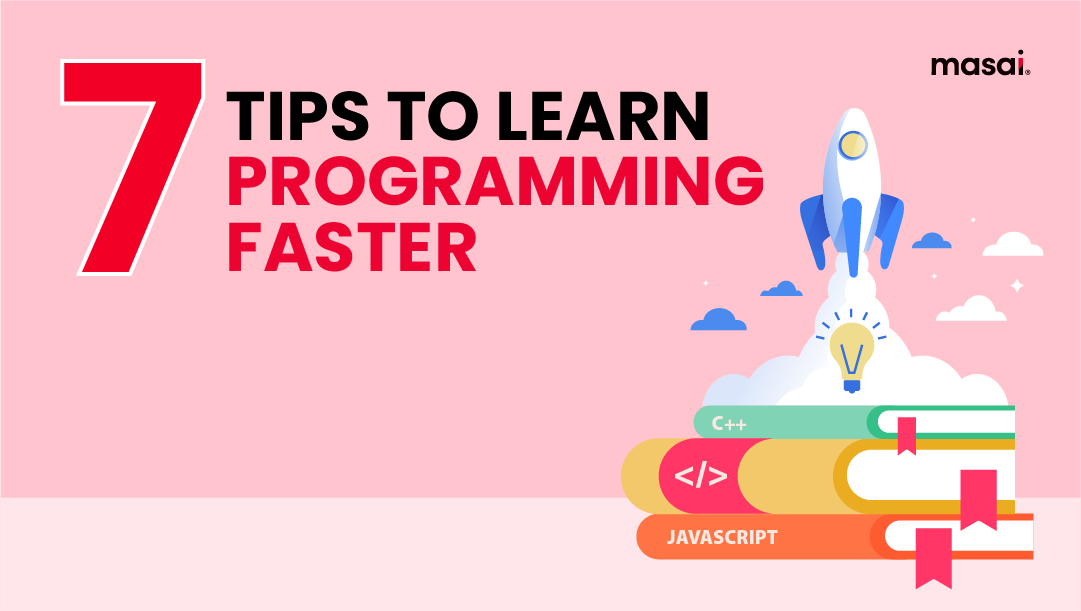7 tips to learn programming faster (A Beginner's Guide)
It didn't take a lifetime for the best in tech to learn programming. It shouldn't take that long for you either.

Accelerate your programming journey with these 7 expert tips. Dive into the world of coding with confidence and efficiency.
A recent report from the Bureau of Labor Statistics anticipated a 25% growth in the employment of software developers, quality assurance analysts, and testers between 2022 and 2031[1]. This is faster than the average for all occupations.
This particular statistic is encouraging enough to make tech aspirants jump off of their beds in ecstasy.
The education industry also seems to have taken note of this fact.
Several mentor-supported classes, subscription-based massive open online courses (MOOCs), and boot camps that accelerate learning have popped up to help the cause.
Although having so many learning resources at our disposal is beneficial, someone starting out on this journey may come across a few questions.
- Where should you begin if you want to learn how to code?
- What do you discover and what do you not discover?
- What is the most efficient way to practice and develop your skills?
It is quite natural to have these questions in your mind when you are starting out on your journey to learn programming. The best in the business have been in similar territory.
It didn't take a lifetime for them to learn programming. It shouldn't take that long for you either.
Here are seven suggestions that can help you fasten your process of learning to programme.
Learn by Coding, Not by Reading
Children cannot learn how to tie their shoelaces by reading about it; they must tie their laces themselves, repeatedly, until the skill is ingrained in their minds.
The principles of coding are similar. Even if you breeze through a chapter of reading and have no trouble comprehending a concept like "for loops," if you don't immediately start experimenting with the code, you won't be able to recall the syntax when it comes time to use it for the first time, or ever.
Practical application is the key to effective learning, problem-solving, and applying theoretical knowledge to real-world contexts. A hands-on approach reinforces understanding and will cultivate skills from critical thinking to adaptability. You will build confidence, and with more confidence, you will attempt harder problems, facilitating the seamless transition from theory to practice.
The same holds true for example code: It's simple to read and generally seems intuitive thanks to the addition of comments and instructions, but you need to actually play around and write (or at least run) the code yourself to fully understand the concepts. In essence, actual coding, that is, practical application, is the bridge that connects knowledge acquisition to its tangible and impactful, making it an indispensable component of education and personal development. So get out there and start coding!
Grasp the Fundamentals for Long-Term Benefits
Fundamentals of programming must always come first, no matter how simple they may seem at first: More complex concepts are simpler to learn the better you understand the simpler ones are. These foundational principles serve as the scaffolding for your advanced learning and critical thinking. It will enhance your ability to digest complex ideas and serve as a guide for acquiring new skills.
Right from the moment students enter the curriculum, they are trained to get into the habit of solving problems. Masai instructors first get them acquainted with concepts. Once the concepts have been taught, both instructors and the students get down to solving problems. Finally, the students are left to apply the concepts and solve problems that are provided in the form of assignments. These assignments reinforce learning by encouraging students to actively engage with problems, analyse, synthesise, evaluate information independently, and apply concepts to real-world scenarios. They also foster time management and organisation skills as students learn to meet deadlines and plan their work.
These assignments are our window into the process followed by the students to grasp the concepts.
It is generally observed that the students who had rushed through the first unit of the curriculum are frequently the first to run into difficulties and submit assignments that reflect their below-par ability to solve problems. Nevertheless, the assignments provide a chance for self-assessment, enabling the students to gauge their progress and make improvements. So, returning to the fundamentals may not be a bad idea after all.
Learning to code might seem difficult. But through a systematic approach to learning not to code but to solve problems, it is possible to learn coding within a matter of 35 weeks. Something we have done for the last 3 years now. Learn more about our pedagogy here.
Be curious
Your natural curiosity will greatly aid your learning. Even when you're not actively learning, you can pick up new skills, create new connections and learn how to incorporate your passions into your work. In other words, if you are interested and and personally invested in the subject, you will look for more information online, such as articles or YouTube videos, to advance your knowledge. You can also ask more seasoned programmers questions by joining forums or Facebook groups for programmers. This is where our Masai instructors step in. In addition to mentoring and guiding you, they are keen to share their on-the-job experiences, what worked for them, and what may work for you.
They may impart knowledge to you that you won't find in books or courses because they are talking about their real-world programming experience. Learn from them and see your collective grapes of the topic soar. Therefore, curiosity gives you the opportunity to learn a lot from wise people and to engage in interesting programming discussions from various angles.
Code by Hand to Sharpen Proficiency
Coding by hand is still one of the best ways to learn how to programme even though computer monitors are getting smaller, hard drives are getting lighter, and programming languages are getting more powerful.
Although coding by hand, whether on a whiteboard or in a notebook, is far removed from the actual coding environment, it requires you to be more careful and precise because you can't run hand-written code in the middle of a project to see if your work is accurate. It forces you to understand the problem thoroughly and devise a solution without relying on code auto-completion or debugging tools. You will begin to emphasise logic and algorithm design over syntax correctness. Moreover, coding by hand is not fixed to a specific programming language, making it a transferable skill. It will also boost technical interviews, where you may not have access to code editors, libraries, or the internet.
Coding by hand, whether on a whiteboard or in a notebook, requires you to be more careful and precise because you can't run hand-written code in the middle of a project to see if your work is accurate.
While initially slowing you down, this restriction will shape you into a more fundamentally sound developer and greatly assist you in college exams. As a result, get in the habit of starting early and coding by hand.
Seek Out Help and Additional Resources
Too often, aspiring programmers believe that asking for help implies that they are admitting defeat or that they aren't "cut out" for programming. In actuality, every programmer has at some point required assistance.
Don't be afraid to ask classmates, mentors, or even seasoned developers for help when you're stuck. If there is one thing that people who are passionate about enjoy, it is teaching others.
Similarly, if a concept taught in a textbook, or through lectures is difficult for you to comprehend, try a different source. Everyone learns differently, so it's not indicative of anything wrong with you if one source doesn't make sense to you. It indicates that the way the material is being delivered to you is not clicking.
There are tonnes of online resources available to teach you computer programming, and you can always find a blog post, YouTube tutorial, Stackoverflow or Reddit post that will make the subject at hand completely understandable.
Take Breaks When Debugging
Debugging is the painfully tedious process of locating and correcting the errant code that is causing problems for your website or application. It's easy to go down the rabbit hole for hours, becoming more frustrated as you go, and thus less productive in your work. Taking breaks during debugging can significantly enhance the efficiency and effectiveness of the debugging process. Debugging can be mentally taxing, and spending prolonged periods staring at code can lead to frustration and decreased focus. Stepping away from the problem and gaining a fresh perspective will help you identify errors more quickly while preventing burnout, reducing the likelihood of making hasty decisions or overlooking crucial details. Whether it's a short walk, a cup of coffee, playing some gully cricket, or a brief distraction, taking breaks during debugging can be strategic and efficient in the long run. Take frequent breaks to prevent this. If you take a break for 30 minutes or three hours, you'll be able to collect your thoughts and return with new insights.
Use the power of community
There is a sizable programming community. Numerous forums, websites like Stackoverflow, Facebook groups, Reddit forums, meetups, and numerous other online and offline locations are available for you to join. It's a great way to learn programming as well as to interact with other programmers and learn from their knowledge and experiences. You can share, discuss, or even show your code to others for review as you learn from others. If other programmers can see your work, they might be able to offer you advice on how to improve it. A good tip is worth its weight in gold.
You can learn programming more quickly by maintaining your confidence in addition to following the aforementioned advice. It's the only way to learn, so be patient with your development and realise that you will fail a lot. If doubts ever cloud your mind, remember that every programmer has walked this path before, none of them any more "destined" to become a developer than you.
References:
Here is a list of few useful resources that can help kickstart your programming journey-

